Russian presidential elections
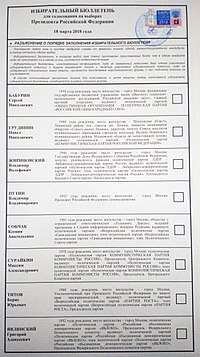
Russian presidential elections determine who will serve as the President of Russia for the next six (formerly four from 1996 to 2012 and five from 1991 to 1996) years.[1]
Since the establishment of the position of the President of Russia in 1991, the presidential elections have taken place seven times: in 1991, 1996, 2000, 2004, 2008, 2012 and 2018.[2][3] The next presidential election is scheduled for March 2024.
Electoral legislation
Russian presidential elections are governed by the Russian Constitution, the Federal law on basic guarantees of electoral rights and the right to participate in referendums of citizens of the Russian Federation and the Federal law on Presidential elections of the Russian Federation. The provisions of the electoral legislation were constantly evolving, but the foundations of the electoral system remained unchanged.
Laws on elections of the President of Russia were adopted 4 times. From 1991 to 2003, before each election a new law was adopted: in 1991,[4] in 1995,[5] in 1999[6] and in 2003.[7] Currently, there is a Federal law "on Presidential elections of the Russian Federation" #19-FZ from January 10, 2003, in the version from December 5, 2017.[8][9]
Candidates
Eligibility
According to law, any citizen of Russia not younger than 35 years can be registered as the candidate for President of the Russian Federation, except persons:[10]
- living in Russia less than 10 years;
- recognized incapable by court or kept in places of deprivation of liberty by the sentence of the court;
- sentenced to deprivation of liberty for committing grave and (or) particularly grave crimes and having on the day of voting not removed and outstanding previous conviction for the specified crime;
- condemned to imprisonment for Commission of the serious crime which criminal record is removed or extinguished - before the expiration of 10 years from the date of removal or repayment of criminal record;
- sentenced to imprisonment for committing a particularly serious crime, the conviction of which is withdrawn or repaid - before the expiration of 15 years from the date of removal or repayment of the criminal record;
- convicted for committing extremist crimes under the Criminal Code of Russia and having on the day of voting not removed and outstanding previous conviction for the specified crime;
- subjected to administrative punishment for Commission of the administrative offenses provided by articles 20.3 (propaganda or public demonstration of Nazi attributes or symbols, or attributes or symbols of extremist organizations, or other attributes or symbols, propaganda or public demonstration of which is prohibited by Federal law) and 20.29 (production and distribution of extremist materials) of the Code of the Russian Federation on Administrative Offenses if vote on the presidential elections takes place before the termination of term during which the person is considered to be subjected to administrative punishment;
- concerning which the sentence of court on deprivation of its right to hold the state positions within a certain term came into force;
- holding the position of President of the Russian Federation for the second consecutive term on the date of official publication of the decision on appointment of election of the President of the Russian Federation;
- having citizenship of a foreign state or a residence permit or other document confirming the right to permanent residence of a citizen of the Russian Federation in the territory of a foreign state.
Gender
From all candidates for President of Russia, only 3 were female candidates. These were Ella Pamfilova in 2000, Irina Hakamada in 2004 and Ksenia Sobchak in 2018. In addition, there were other women who ran for president, but for one reason or another were not registered.[11]
| No. | Year | Picture | Name | Party | Votes |
|---|---|---|---|---|---|
| 1 | 2004 | 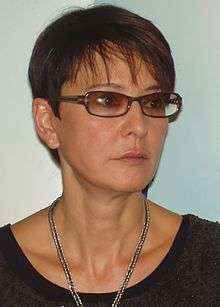 | Irina Khakamada | Independent | 2,672,189 (3.9%) |
| 2 | 2018 | 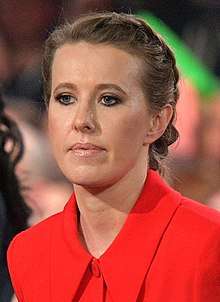 | Ksenia Sobchak | Civic Initiative | 1,226,145 (1.7%) |
| 3 | 2000 | 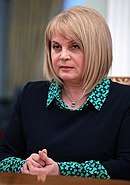 | Ella Pamfilova | For Civic Dignity | 758,966 (1.0%) |
Perennial candidates
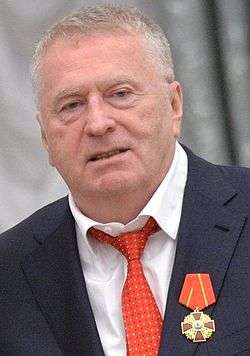
From all candidates, seven candidates participated in the elections more than once (of these, only two each time won the election, Boris Yeltsin and Vladimir Putin). The record for participation in the elections is Vladimir Zhirinovsky, who six times participated in the elections, from the first election in 1991 to 2018 (except 2004 election). Gennady Zyuganov and Vladimir Putin were candidates four times each. Aman Tuleyev and Grigory Yavlinsky — three times, while in 1996 Tuleyev withdrew his candidacy a few days before the election, and Yavlinsky also tried to run in 2012, but was rejected. Boris Yeltsin and Sergey Mironov — twice.
| Electoral results of perennial candidates | ||||||||
|---|---|---|---|---|---|---|---|---|
| Candidate | 1991 | 1996 (1) | 1996 (2) | 2000 | 2004 | 2008 | 2012 | 2018 |
| Yeltsin | 57.3% | 35.3% | 53.8% | |||||
| Tuleyev | 6.8% | <0.1% | 3.0% | |||||
| Zhirinovsky | 7.8% | 5.7% | 2.7% | 9.4% | 6.2% | 5.7% | ||
| Zyuganov | 32.0% | 40.3% | 29.2% | 17.7% | 17.2% | |||
| Yavlinsky | 7.3% | 5.8% | 1.0% | |||||
| Putin | 53.0% | 71.3% | 63.6% | 76.7% | ||||
| Mironov | 0.8% | 3.9% | ||||||
Procedure
Nomination of candidates
Candidates can be nominated by a political party or run as independents.
Political parties represented in the State Duma (the lower house of the Russian parliament) and/or in legislative (representative) bodies of state power in at least one-third of the constituent entities may nominate their candidate without collecting signatures.[12]
A candidate from a political party with no parliamentary representation must gather 100,000 signatures, down from 2 million before amendments to the law in 2012.[12][13][14][15]
An independent candidate must gather 300,000 signatures.[12][16]
Popular vote
The elections are held on the second Sunday of the month when the previous elections were held.[8] If this day coincides with a day preceding a holiday day, or this Sunday falls on the week including a public holiday or Sunday is duly announced a work day, elections are called for the next Sunday.[17]
The president is elected by direct popular vote[18] in a two-round majoritarian contest: if no candidate receives over 50% of the vote in the first round, the two candidates with the most votes advance to a run-off.[19] The second (run-off) round is held exactly three weeks after the first.[20] The second round shall appoint with the written consent of the candidate to participate in the second round. If, prior to the second round, one of the registered candidates to be voted on has withdrawn his candidacy or has left it for other reasons, his / her place shall, by the decision of the Central Election Commission, be transferred to the next registered candidate by the number of votes obtained. A new candidate shall be put to the vote if there is a written Declaration of consent to participate in the second round of elections. Such application must be submitted to them no later than the second day after the departure of the candidate who initially participated in the second round. In this case, the voting shall be held on the first Sunday after 14 days from the date of application. At the end of the second round, the candidate with a simple majority of votes is considered elected. The second round can be held and one candidate, if after the departure of the remaining candidates will be only one. At the same time, the candidate is considered elected if he has received at least 50 percent of the votes.[21]
Election calendar
The typical periods of the presidential election process are as follows, with the dates corresponding to the 2018 election:
- Since September 2016 (legislative election) – Public announcement of the intention to participate in the election.
- December 2017 – Federation Council appoints the election. This should occur in 90–100 days before election day. If the Federation Council does not appoint an election, the election shall be appointed by the Central Election Commission.
- December 2017 to January 2018 – Nominating conventions (including the conventions of the initiative groups for the nomination of independent candidates). Candidates file their Statement of Candidacy with the Central Election Commission.
- January to February 2018 – Collection of signatures for candidates from non-parliamentary parties and independent candidates.
- December 2017 to February 2018 – Registration of candidates.
- February and March, 2018 – Agitation in mass media (including debates).
- March 17, 2018 – Day of silence (ban on any agitation).
- March 18, 2018 – Election Day.
- April 7, 2018 – Day of silence (during the second round).
- April 8, 2018 – Second round (if necessary).
- May 7, 2018 – Inauguration Day.
Video surveillance of the elections
In December 2011 Russian Prime Minister Vladimir Putin proposed the Central Election Commission and the Ministry of Telecom and Mass Communications to ensure the surveillance procedures of voting and counting of votes in the presidential elections.[22] According to the technical task set by the CEC, 91,400 election stations were covered by the video monitoring system. Two cameras were installed on each section. One passed the General plan, the second — directly to an ballot box. A total of 182,800 cameras were installed.[23] Public access to election observation was carried out on a special web site. To view the videos of voting and counting votes, users must select the election stations from which they want to receive broadcasts on the day of voting.[24]
The video surveillance system is used in the 2018 election. So cameras are installed on 80% of election stations. In addition, the chambers were installed for the first time in the territorial election commissions, which carry out the counting of votes at the level of cities and districts.[25]
List of Russian presidential elections
See also
References
- ↑ Ade Asefeso MCIPS MBA (8 January 2013). CEO Guide to Doing Business in Russia. AA Global Sourcing Ltd. pp. 20–. ISBN 978-1-291-28002-9.
- ↑ "TASS: Russian Politics & Diplomacy - Everything you need to know about presidential election in Russia". TASS. 2017-12-26. Retrieved 2018-03-03.
- ↑ "TASS: Russian Politics & Diplomacy - Russia to cast ballots in presidential election on March 18". TASS. 2018-01-01. Retrieved 2018-03-03.
- ↑ Закон РСФСР от 24.04.1991 N 1096-1 "О Выборах Президента РСФСР
- ↑ Федеральный закон от 17.05.95 N 76-ФЗ
- ↑ Федеральный закон от 31 декабря 1999 г. N 228-ФЗ
- ↑ Федеральный закон "О выборах Президента Российской Федерации" от 10.01.2003 N 19-ФЗ (последняя редакция)
- 1 2 Tamara O. Kuznetsova; Elena A. Kremyanskaya; Inna A. Rakitskaya (16 October 2014). Russian Constitutional Law. Cambridge Scholars Publishing. pp. 126–. ISBN 978-1-4438-6970-6.
- ↑ ФЕДЕРАЛЬНЫЙ ЗАКОН О ВНЕСЕНИИ ИЗМЕНЕНИЙ В ФЕДЕРАЛЬНЫЙ ЗАКОН "О ВЫБОРАХ ПРЕЗИДЕНТА РОССИЙСКОЙ ФЕДЕРАЦИИ"
- ↑ "Федеральный закон от 10.01.2003 N 19-ФЗ (ред. от 05.12.2017) "О выборах Президента Российской Федерации" ССтатья 3. Избирательные права граждан Российской Федерации при выборах Президента Российской Федерации". КонсультантПлюс. Retrieved 17 March 2018.
- ↑ Женщины — кандидаты в президенты России
- 1 2 3 "Law freeing political parties from collecting signatures in order to take part in election". President of Russia official website (Kremlin.ru). 2012-05-02. Retrieved 2008-03-03.
- ↑ "Medvedev Signs Off on Election, Party Signature Laws". RIA Novosti. 2 May 2012. Retrieved 1 July 2012.
- ↑ "Партиям сказали, как теперь надо". Kommersant (in Russian) (242 (4783)). 2011-12-24. Retrieved 2018-03-03.
- ↑ "Medvedev Signs Off on Election, Party Signature Laws". Sputnik International. 2012-05-02. Retrieved 2018-03-03.
- ↑ "Партиям сказали, как теперь надо". Kommersant (242 (4783)). 2011-12-24. Retrieved 2018-03-03.
- ↑ "Федеральный закон от 10.01.2003 N 19-ФЗ (ред. от 05.12.2017) "О выборах Президента Российской Федерации" Статья 5. Назначение выборов Президента Российской Федерации". КонсультантПлюс. Retrieved 5 March 2018.
- ↑ Todd Donovan; Shaun Bowler (2004). Reforming the Republic: Democratic Institutions for the New America. Pearson/Prentice Hall. ISBN 978-0-13-099455-4.
- ↑ T. Troxel (9 December 2002). Parliamentary Power in Russia, 1994-2001: President Vs Parliament. Palgrave Macmillan UK. pp. 56–. ISBN 978-0-230-50573-5.
- ↑ Нина Семке (5 September 2017). ЕГЭ. Обществознание. ЛитРес. pp. 140–. ISBN 978-5-04-072821-3.
- ↑ "Федеральный закон от 10.01.2003 N 19-ФЗ (ред. от 05.12.2017) "О выборах Президента Российской Федерации" Статья 77. Повторное голосование на выборах Президента Российской Федерации". КонсультантПлюс. Retrieved 5 March 2018.
- ↑ Путин предлагает установить веб-камеры на все избирательные участки
- ↑ Минкомсвязь: на каждом из 95 тысяч участков установят по 2 веб-камеры
- ↑ Более 200 тысяч пользователей зарегистрировались на webvybory2012.ru
- ↑ ЦИК утвердил порядок организации видеонаблюдения на выборах президента
